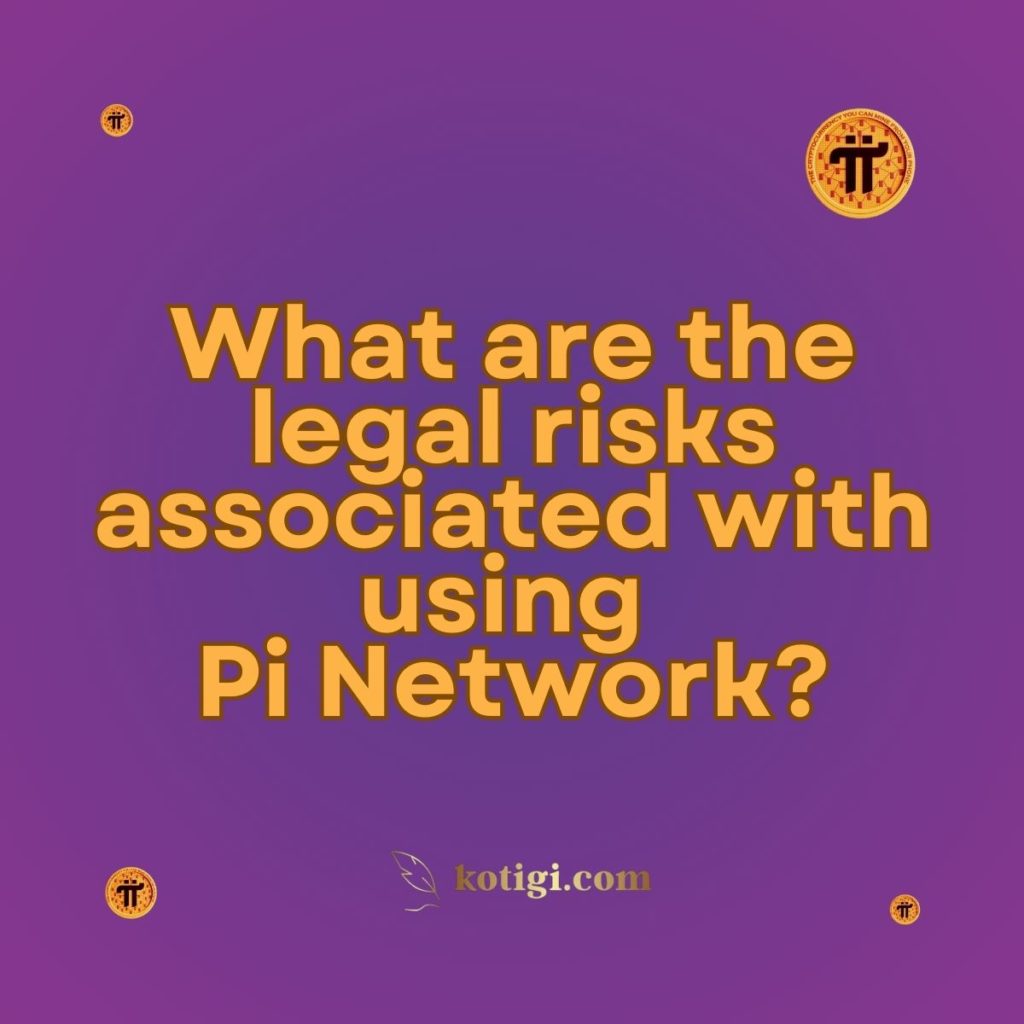
What are the legal risks associated with using Pi Network?
Engaging with the Pi Network involves several legal risks, including regulatory compliance, user privacy concerns, and potential liability related to cryptocurrency usage. Understanding these risks is crucial for ensuring safe participation in the network.
Introduction
As the cryptocurrency landscape continues to evolve, users of platforms like Pi Network must navigate a complex web of legal risks. The decentralized nature of blockchain technology presents unique challenges, especially regarding regulatory compliance, user privacy, and potential liabilities. Understanding these risks not only helps users engage responsibly but also empowers them to make informed decisions about their participation in the network. This post aims to explore the various legal risks associated with using Pi Network, providing insights into how these factors can impact user experience and engagement with the platform.
Table: Legal Risks Associated with Using Pi Network
| Legal Risk | Description | Impact on Users |
|---|---|---|
| Regulatory Compliance | Adherence to varying cryptocurrency regulations across jurisdictions. | Users may face restrictions or obligations based on their location, including KYC requirements and tax implications. |
| User Privacy Concerns | Issues related to the collection, storage, and use of personal data under regulations like GDPR. | Non-compliance can result in heavy fines for the platform and compromise user trust, leading to reduced engagement. |
| Liability and User Agreements | Limitations of the platform’s liability for user losses and the terms governing user responsibilities. | Users may find it challenging to seek recourse in case of disputes, potentially limiting their rights and protections. |
| Intellectual Property Risks | Risks associated with copyright, trademark, and patent issues, especially in content creation and software development. | Users must be cautious not to infringe on IP rights, as violations can lead to legal disputes and consequences that may affect their participation in the network. |
| Market Risks and Scams | Exposure to market volatility and fraudulent schemes targeting cryptocurrency users. | Users need to remain vigilant against scams, ensuring they engage only with credible services and platforms to protect their assets. |
Analysis
This table provides a concise overview of the various legal risks associated with using the Pi Network. By understanding these risks, users can take proactive measures to navigate the legal landscape effectively.
- Regulatory Compliance: Awareness of local regulations will enable users to adhere to necessary requirements, minimizing the risk of penalties.
- User Privacy Concerns: By understanding how their data is used, users can make informed decisions about their participation and protect their privacy.
- Liability and User Agreements: Familiarity with the terms of service allows users to understand their rights and responsibilities, promoting a safer user experience.
- Intellectual Property Risks: Recognizing the importance of respecting IP rights can prevent legal complications that may arise from content creation or software modifications.
- Market Risks and Scams: By staying informed about market dynamics and potential scams, users can safeguard their investments and maintain trust in the network.
Overall, this structured approach to understanding the legal risks associated with Pi Network helps users engage more safely and responsibly, ultimately fostering a healthier ecosystem for all participants.
Regulatory Compliance
Regulatory compliance stands as one of the most significant legal risks facing Pi Network users today. Given the fragmented nature of cryptocurrency regulations across various jurisdictions, the operations of the Pi Network may fall under a diverse array of regulatory frameworks. The classification of a cryptocurrency can drastically affect the responsibilities of both the network and its users. In many jurisdictions, if a cryptocurrency is classified as a security, it must adhere to a multitude of stringent regulations. This classification could impose additional compliance obligations, such as registration requirements and ongoing reporting, which might complicate the user experience. Thus, understanding these regulatory landscapes is essential for users who wish to engage with the Pi Network responsibly and legally.
Classification of Cryptocurrency
Understanding how different jurisdictions classify cryptocurrencies can significantly impact users’ responsibilities and rights. For example, if Pi Network coins are deemed securities in a particular region, users may face restrictions on trading and holding these assets, which can limit their ability to use the network as intended.
Know Your Customer (KYC) Requirements
As part of regulatory compliance, many jurisdictions require platforms to implement Know Your Customer (KYC) processes to verify users’ identities. This regulatory measure helps to prevent fraud, money laundering, and other illicit activities, but it can complicate the user experience. Users may find the onboarding process to be lengthy and invasive, which could deter some potential participants from fully engaging with the network.
Tax Implications
Users should be acutely aware of the tax obligations associated with earning and trading Pi coins. Different countries have varying laws regarding cryptocurrency taxation, which could lead to legal complications if not adhered to properly. For instance, in some jurisdictions, users may be required to report gains from their Pi transactions as taxable income. Failure to comply with these regulations could result in hefty fines or legal repercussions, underscoring the importance of staying informed about tax implications.
User Privacy Concerns
User privacy is another significant concern when engaging with any cryptocurrency platform, including Pi Network. The platform must comply with various data protection regulations, such as the General Data Protection Regulation (GDPR) in Europe, which establishes strict guidelines on how personal data is collected, stored, and utilized. Violations of these regulations can lead to severe financial penalties and loss of user trust, making it imperative for the Pi Network to prioritize user privacy.
Data Protection Regulations
Understanding the applicable data protection laws is crucial for both the platform and its users. Non-compliance can lead to heavy fines and damage the platform’s reputation, which in turn could diminish user engagement and participation.
Personal Information Handling
The requirement for personal information during KYC processes raises concerns regarding how this data is stored and protected. Users need to ensure that the platform employs robust security measures to safeguard their sensitive information. Without adequate protection, users may become vulnerable to data breaches and identity theft.
Data Breach Risks
Data breaches pose a significant risk to user privacy. In the unfortunate event of a breach, users could fall victim to identity theft or financial fraud. This emphasizes the importance of strong data security measures, including encryption and secure storage solutions, to protect user data from unauthorized access.
Liability and User Agreements
Engaging with Pi Network necessitates that users accept terms of service that outline their rights and responsibilities. These terms typically include clauses that limit the platform’s liability for losses incurred while using the network, which can significantly impact users’ legal recourse in the event of disputes. Understanding these terms is essential for users to protect themselves from potential risks.
Understanding Terms of Service
Carefully reviewing the terms of service is essential for users to understand their legal standing and any limitations on recourse should they encounter issues. Many users may overlook this critical step, potentially exposing themselves to unexpected liabilities or restrictions.
Dispute Resolution Mechanisms
Terms of service often include dispute resolution clauses that dictate how conflicts between users and the platform will be resolved. These clauses can vary widely in their effectiveness and fairness, influencing the outcomes of potential disputes and shaping users’ experiences with the platform.
User Responsibilities
Users must also be aware of their responsibilities outlined in the terms. These may include maintaining the confidentiality of their accounts and adhering to the community guidelines. Failure to comply with these responsibilities can lead to penalties, including the suspension or termination of their accounts.
Intellectual Property Risks
Engaging with a blockchain platform like Pi Network exposes users to various intellectual property (IP) risks that must be carefully considered. These risks can arise in multiple forms, including copyright, trademark, and patent issues, which can significantly impact content creators and developers within the network.
Copyright and Trademark Issues
Users should be mindful not to infringe on the copyrights or trademarks of others when creating or sharing content within the Pi Network. Missteps in this area could lead to legal disputes that not only affect the individuals involved but could also tarnish the reputation of the network as a whole.
Open-Source Contributions
While Pi Network’s software may be open-source, users must understand the implications of modifying such software under its licensing agreements. Failure to comply with these licenses can lead to legal repercussions, including the potential for lawsuits or the revocation of access to the network.
Protecting Original Content
If users create original content, they should consider how to protect their IP rights to prevent unauthorized use or reproduction. Establishing clear ownership and licensing agreements can help mitigate these risks, ensuring that creators are compensated for their work.
Market Risks and Scams
The cryptocurrency market is notoriously volatile and rife with scams, which poses significant risks for users of Pi Network. Users need to be vigilant and informed to navigate this challenging landscape effectively.
Awareness of Fraudulent Schemes
Users must remain vigilant against scams targeting cryptocurrency participants, including phishing attacks that can compromise personal information. Understanding common scam tactics can significantly reduce the likelihood of falling victim to these fraudulent schemes.
Researching Third-Party Services
Before engaging with third-party services related to Pi Network, users should conduct thorough research to verify the legitimacy of these platforms. Scammers often impersonate legitimate services, so ensuring that any service is credible is crucial for protecting personal assets.
Protecting Personal Information
To mitigate risks, users should stick to official channels and trusted sources for information and updates related to the Pi Network. By maintaining a cautious approach to sharing personal information and engaging with unknown parties, users can help safeguard their digital assets.
Conclusion
Navigating the legal landscape of cryptocurrency platforms like Pi Network can be complex and fraught with risks. Understanding regulatory compliance, user privacy concerns, liability issues, and intellectual property rights is crucial for responsible participation in the network. By staying informed and cautious, users can mitigate potential legal risks and engage more securely with the Pi Network. As the cryptocurrency ecosystem continues to evolve, being proactive in understanding these legal challenges will ultimately benefit users, enabling them to participate safely and responsibly in this innovative space.
Key Takeaways
- Regulatory compliance is vital to avoid legal repercussions.
- User privacy concerns should be addressed through careful data management.
- Understanding liability in user agreements can protect users from losses.
- Intellectual property rights must be respected to avoid legal issues.
- Vigilance against market risks and scams is essential for user safety.




